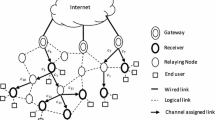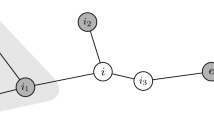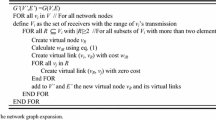Abstract
A wireless mesh network (WMN) is a type of communication network made up of wireless devices and organized in a mesh topology. Multicast is a fundamental service in WMNs because it efficiently distributes data among a group of nodes. Multicast algorithms in WMNs are designed to maximize system throughput and minimize delay in order to satisfy the end users’ requirement. Previous work has unrealistically assumed that the underlying WMN is link-homogeneous. We consider one important form of link heterogeneity: different link loss ratios, or equivalently different ETX. Different from other work addressing multicast in wireless networks, we point out that the local broadcast quality relies on the worst involved link. We model different link loss ratios by defining a new graph theory problem, Heterogeneous Weighted Steiner Connected Dominating Set (HW-SCDS), on an edge-weighted directed graph, where the edge weights model ETX, the reciprocal of link loss ratios. We minimize the number of transmissions in a multicast by computing a minimum HW-SCDS in the edge-weighted graph. We prove that HW-SCDS is NP-hard and devise a greedy algorithm for it. To improve the effectiveness of our algorithm, we design a dedicated channel assignment algorithm. Simulations show that our algorithm significantly outperforms the current best WMN multicast algorithm by both increasing throughput and reducing delay.













Similar content being viewed by others
References
Akyildiz, I., & Wang, X. (2005). A survey on wireless mesh networks. In IEEE Radio Communications.
Tang, J., Xue, G., & Zhang, W. (2006). Maximum throughput and fair bandwidth allocation in multi-channel wireless mesh networks. In INFOCOM 06.
Shin, D., & Bagch, S. (2009). Optimal monitoring in multi-channel multi-radio wireless mesh networks. In MOBIHOC 09.
Roy, S., Koutsonikolas, D., & Das, S., Hu, Y. C. (2006). Highthroughput multicast routing metrics in wireless mesh networks. In ICDCS 06.
Katti, S., & Databi, D., Balakrishnan, H., Medard, M. (2008). Symbol-level network coding for wireless mesh networks. In SIGCOMM 08.
Zeng, G., Wang, B., Ding, Y., Xiao, L., & Mutka, M. (2007). Multicast algorithms for multi-channel wireless mesh networks. In ICNP 07.
Raniwala, A., & Chiueh, T. (2005). Architecture and algorithms for an ieee 802.11-based multi-channel wireless mesh network. In IEEE INFOCOM 05.
Dhananjay, A., Zhang, H., Li, J., & Subramanian, L. (2009). Practical, distributed channel assignment and routing in dual-radio mesh networks. In SIGCOMM 09.
Wu, D., & Mohapatra, P. (2010). From theory to practice: Evaluating static channel assignments on a wireless mesh network. In INFOCOM 10.
Aguayo, D., Bicket, J., Biswas, S., Judd, G., & Morris, R. (2004). Link-level measurements from an 802.11b mesh networks. In SIGCOMM 04.
Couto, D., Douglas, S.J., Aguayo, D., Bicket, J., & Morris, R. (2003). A highthroughput path metric for multihop wireless routing. In MOBICOM 03.
Guha, S., & Khuller, S. (1998). Approximation algorithms for connected dominating sets. Algorithmica, 20(4).
Zeng, G., Wang, B., Ding, Y., Xiao, L., & Mutka, M. (2009). Efficient multicast algorithms for multi-channel wireless mesh networks. IEEE Transactions on Parallel and Distributed Systmes, 21(1):86–99
Jetcheva, J., & Johnson, D.B. (2001). Adaptive demand-driven multicast routing in multi-hop wireless ad hoc networks. In MobiHoc 2001.
Wang, B., Mutka, M., & Torng, E. (2008). Optimization based rate allocation and scheduling in TDMA based wireless mesh networks. In ICNP 08.
Wei, W., & Zakhor, A. (2007). Multiple tree video multicast over wireless ad hoc networks. In IEEE Trans.IEEE Transactions on Circuits and Systems for Video Technologyl, 17(1):2–15.
Koutsonikolas, D., Hu, Y., & Wang, C. (2009). High-throughput, reliable multicast without crying babies in wireless mesh networks. In INFOCOM 09.
Garcia-Luna-Aceves, J. J., & Madruga, E. L. (1999). The core-assisted mesh protocol. In IEEE Journal on Selected Areas in Communications, 17(8).
Das, S., Manoj, B., & Murthy, C. (2002). A dynamic core based multicast routing protocol. In MobiHoc 2002.
Chen, K., & Nahrstedt, K. (2005). Effective location-guided overlay multicast in mobile ad hoc networks. In International Journal of Wireless and Mobile Computing (IJWMC), 3.
Chachulski, S., Jennings, M., Katti, S., & Katabi, D. (2007). Trading structure for randomness in wireless opportunistic routing. In SIGCOMM 07.
Chachulski, S., Jennings, M., Katti, S., & Katabi, D. (2008). "On end-to-end throughput of opportunistic routing in multirate and multihop wireless networks. In INFOCOMM 08 .
Xiang, X., Wang, X., & Yang, Y. (2010). Stateless multicasting in mobile Ad Hoc networks. IEEE Transactions On Computers 59(8).
Blum, J., Ding, M., Thaeler, A., & Cheng, X. (2005). Connected dominating set in sensor networks and MANETs. In MOBICOM 05 .
Wu, Y., Xu, Y., Chen, G., & Wang, K. (2005). On the construction of virtual multicast backbone for wireless Ad Hoc networks. In MASS 05.
Ling, D., Gao, X., Wu, W., Lee, W., Zhu, X., & Du, D. (2010). Distributed construction of connected dominating sets with minimum routing cost in wireless networks. ICDCS 10.
Chekuri, C., Even, G., Gupta, A., & Segev, D. (2008). Set connectivity problems in undirected graphs and the directed steiner network problem. In SODA 08.
Chou, L., Hsieh, H., & Chen, J. (2004). Multicast with QoS support in heterogeneous wireless networks. In EUC 04.
Li, P., & Fang, Y. (2010). The capacity of heterogeneous wireless networks. In INFOCOM 10.
Li, N., & Hou, J. (2004). Topology control in heterogeneous wireless networks: problems and solutions. In INFOCOM 04.
Simunic, T., Qadeer, W., & Micheli, D.G. (2005). Managing heterogeneous wireless environments via Hotspot servers. In MMCN 05.
Ji, M., Wang, Z., Sadjadpour, H., & Garcia-Luna-Aceves, J. (2010). The capacity of Ad Hoc networks with heterogeneous traffic using cooperation. In INFOCOM 10.
Kumar, A., & Hegde, K. (2009). Multicasting in wireless mesh networks: Challenges and opportunities. In ICIME ’09.
Yuan, J., Li, Z., Yu, W., & Li, B. (2006). A cross-layer optimization framework for multihop multicast in wireless mesh networks. IEEE Journal of Selected Areas in Communications, 24(11):2092–2103
Chakeres, I., Koundinya, C., & Aggarwal, P. (2008). Fast, efficient, and robust multicast in wireless mesh networks. In The 5th ACM symposium on performance evaluation of wireless Ad Hoc, sensor, and ubiquitous networks, pp. 19–26.
Lim, S., Kim, C., Ko, Y., & Vaidya, N. (2009). An efficient multicasting for multi-channel multi-interface wireless mesh networks. In MILCOM 09.
Cheng, H., & Yang, S. (2008). Joint multicast routing and channel assignment in multiradio multichannel wireless mesh networks using simulated annealing. LNCS, 5361:270–380
Nguyen, U. (2008). On multicast routing in wireless mesh networks. Computer Communications, 31(7):1385–1399
Koutsonikolas, D., & Hu, Y. (2009). Exploring the design space of reliable multicast protocols for wireless mesh networks. Ad Hoc Networks: 932–954.
Zhao, X., Chou, C., Guo, J., & Jha, S. (2007). A scheme for probabilistically reliable multicast routing in wireless mesh networks. In IEEE LCN 07.
Ghaderi, M., Towsley, D., & Kurose, J. (2008). Reliability gain of network coding in lossy wireless networks. In IEEE INFOCOM 08.
Acknowledgements
This paper is supported in part by the National Science Foundation under grant numbers OCI-0753362, CNS-0709970, and CNS-0721441.
Author information
Authors and Affiliations
Corresponding author
Rights and permissions
About this article
Cite this article
Zeng, G., Wang, B., Mutka, M. et al. Efficient link-heterogeneous multicast for wireless mesh networks. Wireless Netw 18, 605–620 (2012). https://doi.org/10.1007/s11276-012-0422-7
Published:
Issue Date:
DOI: https://doi.org/10.1007/s11276-012-0422-7





